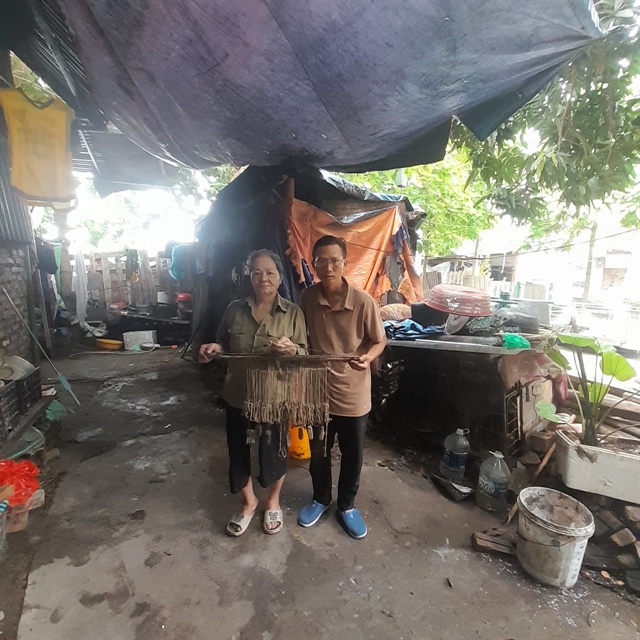 Society
Society


|
| Nguyễn Thị Bình (left) and a reporter, holding the body-retrieving tool. — Photo nld.com.vn |
HÀ NỘI — Nguyễn Thị Bình, a resident of Tứ Liên Ward, Tây Hồ District, Hà Nội City, has dedicated her life to a unique and often overlooked job: retrieving dead bodies from the Red River.
For over four decades, she has tirelessly scoured the river's waters, providing solace to grieving families and offering a final resting place for those who have lost their lives in the river.
The deaths were due to a myriad of reasons: drowning in floods, drowning in boat capsizes, suicides due to business losses, suicides due to family conflicts, and so on.
When a family approaches Bình seeking help in retrieving their drowned loved one, she assures them of her unwavering support. Then she takes a sip of wine and fish sauce to ritually warm herself and pushes her boat into the middle of the river to search back and forth.
Her tool is simple yet effective: a bunch of fishing lines adorned with countless sharp hooks. If the hooks snag on the clothes or flesh of a body, she will pull it close to her boat and jump in to tie it to a rope, dragging it to shore and handing it over to the family for burial.
Sometimes she encounters a body that has been decomposed for a long time, with which she has to be very careful as even a light touch could cause the fresh to fall apart.
Sometimes she retrieves a body that no family claims. In that case, she takes it ashore and builds a grave for the person herself.
There are many fishermen on the Red River but only Bình does this job because most people living on the river consider retrieving bodies a taboo.
According to them, retrieving bodies is robbing Hebo (a river deity) of his 'food' and could result in punishment. But Bình thinks differently.
She believes that retrieving the bodies of those who have drowned is a good deed and it makes no sense for Hebo to punish someone who is doing a good deed.
When asked how much she gets paid for the job, she replied she lives mainly from fishing and occasionally as a grave digger for hire. Retrieving bodies is simply a free job she does to help people. For some poor families, she even has to pay for burial shrouds.
"If I had taken money from people for retrieving bodies over the past few decades, my family would probably be rich, not poor as we are now," said Bình.
Bình and her child live in a house with a corrugated iron roof. There is nothing of value in the house as fishing does not bring in much money. She said if she had the money, she would fix the walls and roof, and buy a bed and a TV to watch the news every day.
Even on hot days, rainy days, or when she was seriously ill if someone came to her for help finding a body, she would forget all about her illness and rush down to the boat and go out on the river to search.
But not all her searches had results.
One month ago, a family came to her asking for her help in finding their daughter's body, who had committed suicide by jumping into the river. Despite the rapid current of the river that day, she agreed to help.
"The river water was rising high, swirling and roaring so loudly that just looking at it made me dizzy, but I helped them regardless," she said.
She took her tool and set off. She rowed her boat and cast her fishing lines, searching along a stretch of the river but couldn't find the body.
The mother stood on the bank sobbing, begging for her daughter's body to float to the surface so that the family could bring her home for burial, but to no avail.
On another occasion, a man asked her to find his wife's body. He told her the whole story, about how they argued on the bridge. In a fit of anger, he slapped his wife, and to his surprise, she jumped off the bridge and committed suicide.
"I searched for days on my boat but couldn't find her body," said Bình. "Her body was later found downstream in Nam Định Province."
Now that she is over 60, she has thought many times about retiring, but fate seems determined to keep her tied to this job. — VNS




